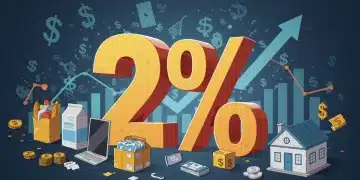Inflation impact on consumers: what you need to know

The impact of inflation on consumers includes decreased purchasing power, changes in spending habits, and the need for effective budgeting and investment strategies to navigate rising prices.
Inflation impact on consumers can be seen in every grocery store and gas station. Have you noticed how your favorite items are costing more? Let’s dive into the effects of inflation on your finances and explore ways to cope.
Understanding inflation and its causes
Understanding the inflation impact on consumers is crucial for managing personal finances. Inflation refers to the overall rise in prices, leading to a decrease in the purchasing power of money. But what causes inflation? Let’s explore some of the main factors.
Major Causes of Inflation
There are several forces that drive inflation in an economy. These can be grouped into demand-pull inflation and cost-push inflation. Demand-pull inflation occurs when demand for goods and services exceeds supply, while cost-push inflation happens when the cost of production increases.
- Increased consumer spending due to higher wages.
- Supply chain disruptions affecting availability of products.
- Rising costs of raw materials.
- Government policies and spending.
Both types of inflation can affect consumers in various ways. For instance, when prices rise, consumers may find it harder to afford essential goods. This can lead to difficult choices about spending and saving. Additionally, inflation can affect interest rates, which in turn impacts loans and savings.
The Role of Central Banks
Central banks play a key role in managing inflation through monetary policy. They can increase interest rates to slow down spending when inflation is rising too quickly. Conversely, they may lower rates to stimulate spending during a downturn. These decisions directly influence the inflation impact on consumers as they affect borrowing costs.
Overall, understanding these underlying causes of inflation can help you anticipate changes in your finances. Being informed allows consumers to make better decisions when budgeting. Tracking inflation trends can also guide when to make larger purchases or investments.
How inflation affects consumer behavior

How does inflation affect consumer behavior? This question is important as rising prices influence what people buy and how much they spend. When inflation occurs, consumers often change their purchasing habits to adapt to new economic realities.
Shifts in Spending Habits
Consumers tend to prioritize essentials like food and housing when inflation affects their finances. Non-essential items, such as luxury goods, often see a decline in sales. This shift can lead to long-lasting changes in market trends, as producers adjust to consumer demands.
- Increased demand for budget-friendly options.
- Preference for generic brands over name brands.
- Delayed purchases of big-ticket items.
- More focus on discounts and sales.
Retailers notice these changes and often respond by offering promotions and adjusting their inventory. This behavior from consumers can push businesses to reconsider their pricing strategies and product offerings, knowing that people are mindful of their spending.
The Impact on Consumer Confidence
Furthermore, inflation can lead to decreased consumer confidence. When individuals feel uncertain about their financial futures, they may hesitate to spend money. This caution can slow economic growth, as less spending affects businesses of all sizes.
People may start saving more, fearing that prices will continue to rise. This shift can hurt various sectors, especially those relying on discretionary spending. Inflation not only changes specific buying behaviors but can also shape the overall economic landscape, highlighting the interconnectedness of consumer psychology and economic conditions.
In response to these factors, analyzing trends can help consumers make smarter choices. Understanding how inflation impacts personal budgets allows for better planning in the face of future price increases.
Strategies for managing inflationary pressure
Managing the pressure of inflation can be challenging, but using effective strategies can help consumers stay afloat. There are several ways to adapt to rising prices while protecting your finances.
Budgeting Wisely
One of the most important strategies is to create a budget. By tracking your expenses, you can identify areas where you can cut back. This can free up funds for essentials that might be rising in price. A well-planned budget helps you allocate your money more effectively.
- Review monthly expenses and eliminate unnecessary subscriptions.
- Focus on essential purchases first before considering non-essentials.
- Use budgeting apps to monitor and adjust your spending.
- Set aside savings for emergencies.
Having a budget not only assists with managing current expenses but also encourages long-term financial planning. This approach instills a sense of financial security, particularly when facing economic uncertainty like inflation.
Exploring Alternatives
Another effective strategy is to explore alternatives for your regular purchases. Whether it is shopping for generic brands or buying in bulk, these options can lead to significant savings. Being adaptable and open to less expensive alternatives is key during inflationary periods.
For instance, instead of always purchasing name-brand products, consider trying store brands. Many store brands offer similar quality at a lower cost. Bulk buying can also be beneficial, especially for non-perishable goods, as it lowers the price per unit.
Investing in Education
Investing in financial education can also pay off. Understanding how inflation works helps you make informed decisions about saving and investing. Keeping yourself updated on economic trends allows you to plan better and respond to changes positively. Numerous resources are available, from online courses to financial advisors.
Finally, consider investing in assets that traditionally hold value during inflationary times, such as real estate or commodities. These investments may provide a safeguard against the erosion of purchasing power.
The long-term consequences of persistent inflation

The long-term effects of persistent inflation can shape economies and consumer behavior. When inflation remains high over time, it leads to significant changes in purchasing power and overall economic stability.
Impact on Purchasing Power
One of the most noticeable consequences of long-term inflation is the erosion of purchasing power. As prices rise, the same amount of money buys fewer goods and services. This shift forces consumers to adjust their budgets continuously.
- Increased difficulty in affording basic necessities.
- Shifts towards cheaper alternatives and products.
- Long-term changes in saving and spending habits.
- Potential decrease in overall quality of life.
As prices escalate, families may feel pressure to cut back on non-essential spending. This can lead to a decline in demand for various products, which may negatively impact businesses as well.
Effects on Investments
Persistent inflation can also complicate investment strategies. Investors typically seek returns that outpace inflation to maintain their wealth. When inflation is consistently high, it challenges this goal, pushing individuals to seek out more volatile investment options.
Riskier assets, like stocks and real estate, may seem more appealing during inflationary periods as they have the potential to generate higher returns. However, this trend can lead to market instability if too many investors flock to these options without regard for risk.
Changes in Economic Policy
Governments and central banks tend to respond to ongoing inflation with changes in economic policies. These adjustments can range from altering interest rates to revising fiscal policies. Such measures are intended to stabilize the economy and restore consumer confidence.
The long-term landscape of inflation also affects people’s expectations. If individuals expect rising prices, they may make decisions that further fuel inflation, such as demanding higher wages. This cycle can perpetuate inflation and create a challenging environment for economic recovery.
The long-term consequences of persistent inflation affect everyone’s life. As inflation continues, consumers will see their purchasing power decline. People must adapt by changing spending habits and focusing on essentials. Understanding how inflation impacts investments is key for making smart financial choices. Lastly, economic policies will shift as governments react to persistently high inflation. Staying informed and flexible enables individuals to navigate these changes effectively.
FAQ – Questions about the impact of inflation on consumers
What is inflation and how does it affect me?
Inflation is the rate at which prices for goods and services rise, decreasing purchasing power. It affects your ability to buy everyday items.
How can I manage my budget during inflation?
Creating a budget that prioritizes essentials can help you manage your spending. Look for ways to cut unnecessary expenses.
What strategies should I use for investing during inflation?
Consider investing in assets that typically hold their value, like real estate or commodities. Diversifying your investments can also be beneficial.
How can inflation impact my savings?
If inflation outpaces your savings interest rate, the real value of your savings decreases. This means your money buys less in the future.





